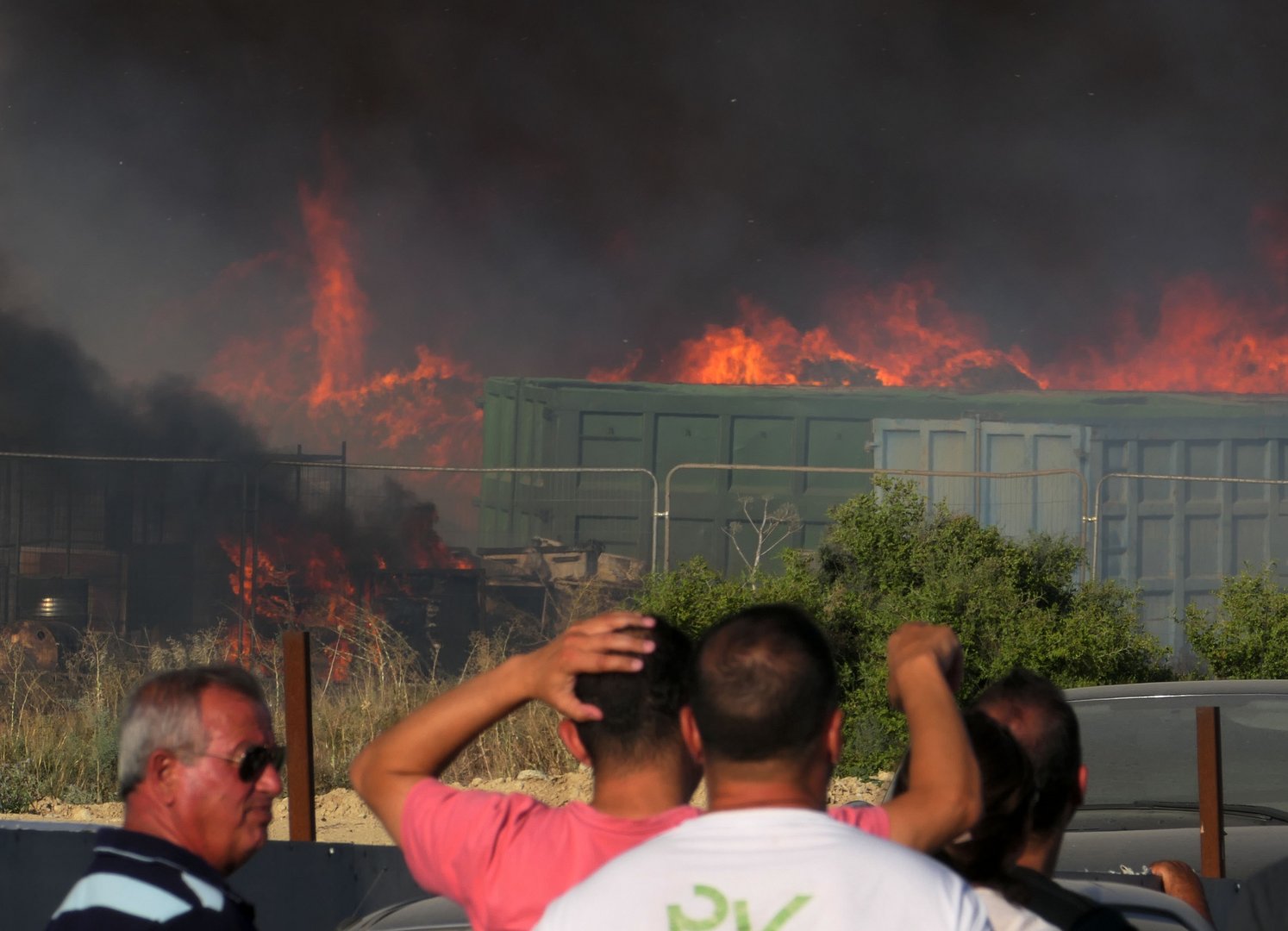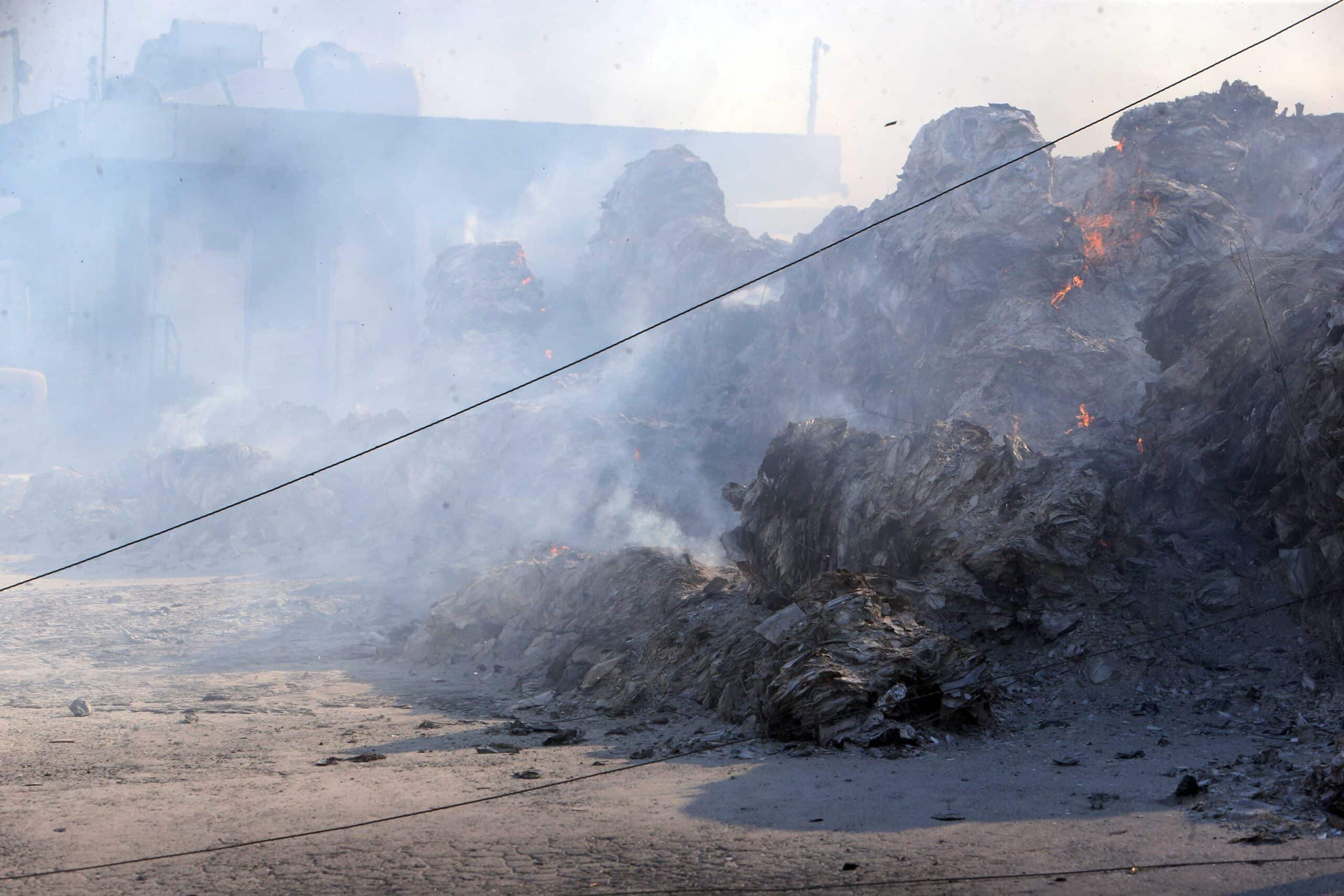And that’s aside from the health and building zone concerns
When one of only two paper and plastic recycling processing plants burnt down in Geri, Nicosia last week, it caused an enormous problem in the processing of these waste materials as alternatives need to be found quickly.
The Ecobalance Recycling Ltd plant, which was collecting paper and plastics from the recycling collection company Green Dot, burnt down after a pile of waste was brought by a truck to the plant. The truck seems to have had some flammable material inside that caught alight and caused the blaze that destroyed the factory.
Following the blaze, all paper and plastic recycled at the unit will temporarily be taken to a nearby unit.
However, a permanent solution needs to be found, at least by the end of the year.
Since the fire, the state has had to find other temporary solutions, the environment department said.
Green Dot is already looking to send some of the material it collects to the integrated waste management facility in Koshi, outside Larnaca.
But that is only a temporary solution as Koshi already handles waste from Nicosia, Larnaca and Famagusta and also does not recycle, aside from organic waste.
Ecobalance Recycling Ltd plant in Geri was only one of two that were collecting and processing plastics and paper and shipping it off for recycling.
The other company that does the same as Ecobalance is in Limassol, and according to what a representative from the environment department told the Cyprus Mail is too small to process the waste from the Nicosia plant.
“We are dependent on recycling these materials on just two plants in Cyprus, and now one is gone,” the representative from the environment department said.
Recycling issues aside, there were also health concerns. Greens leader Charalambos Theopemptou told the Cyprus Mail that the blaze “released dioxins into the air, and non-volatile gases that do not dissipate”.
However, weighing in, Environment Commissioner Maria Panayiotou said that as soon as the fire broke out, authorities from various state organisations rushed to the area and cooperated in taking measurements to determine the pollutants being released.
According to the information registered, the levels remained low, but residents in the area were advised to preventatively shelter inside and take precautions.
“We all worked together to take preventative action, and measurements of the air quality were taken quickly for the protection of the public,” Panayiotou said:
According to the World Health Organisation, dioxins are environmental pollutants.
“They belong to the so-called ‘dirty dozen’ – a group of dangerous chemicals known as persistent organic pollutants (POPs). Dioxins are of concern because of their highly toxic potential. Experiments have shown they affect a number of organs and systems,” the organisation says.
“Once dioxins enter the body, they last a long time because of their chemical stability and their ability to be absorbed by fat tissue, where they are then stored in the body.”
In Geri, further measurements conducted on the air quality showed that because of the weather conditions measurements were recorded showing lower levels of dioxins, not raising concern.
This latest blaze had been out of the blue for the environment department, which had earlier in the week expressed some concerns similar incidents might occur in the future due to the high temperatures that prevail in the summer.
Last year, in the months of May and June, department inspectors carried out several checks on several waste management facilities operating within the heavy industry zone of Dali and Geri and found that most of the facilities either do not have an integrated fire safety system, or they have taken some individual measures.
The fire itself burned the plant’s facilities down, and for days after there were flare ups from the piled materials that were still burning.
These proved difficult to deal with as for water to be used, the piles would have had to have been knocked down, increasing the risk of the fire spreading again.
The piles were unable to be buried on the days when the thermal load was still high, because it would have caused furnace conditions, and the materials would have smouldered, the fire services had said.
Meanwhile, the fire also raised alarm to residents of Geri, and nearby towns of Tseri, Latsia, who have called on the president to take measures to protect residents.
In a joint statement, the municipalities emphasised that it is the umpteenth time that they have witnessed these serious and dangerous incidents, which occur very close to other industrial premises dealing with the storage of fuel, bleach and asphalt production, “as a result increasing the risk to the health and safety of our residents”.
They also requested increased inspections from the relevant departments and report that these “are currently being carried out by two officials of the environment department, who are in charge of inspecting the entire district of Nicosia”.
A special service needs to be created and staff need to be brought in, as it was part of the governance programme President Nikos Christodoulides outlined for better protection of the environment, the municipalities said.
Based on a study carried out in 2018 by the European Commission on the needs of Cyprus, this service should be staffed by approximately 45 staff, while at the moment the environment department has around eight inspectors Cyprus-wide, the municipalities said, citing the study.
They said that the situation is out of control.
“Our residents cannot be spectators to the same movie, every summer,” they said.








Click here to change your cookie preferences